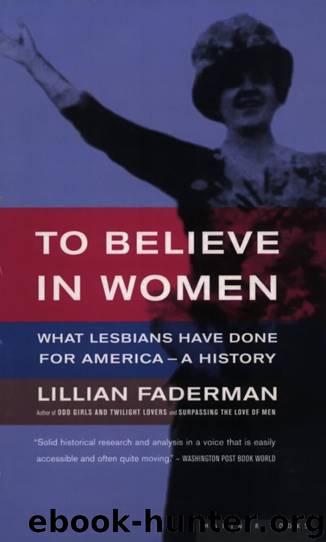To Believe in Women: What Lesbians Have Done For America - A History by Lillian Faderman

Author:Lillian Faderman [Faderman, Lillian]
Language: eng
Format: epub
Publisher: Houghton Mifflin Harcourt
Published: 2000-06-07T22:00:00+00:00
What M. Carey Thomas Accomplished for the Cause of Women
As the head of Bryn Mawr College in the late nineteenth century, still under the spell of the values of her youth, M. Carey Thomas wished the women in her charge to become what she had always considered the highest type of human beings—scholars. As scholars, they would be female equivalents of Cardinal Newman's nineteenth-century gentleman; they would be "as well known and universally admired a type as the Oxford and Cambridge man," she dreamed in an 1899 presidential address. But she realized that these women, whom she wanted to create in her own hard-won image, must be economically self-sufficient, and she encouraged them to that end. As the ruling spirit behind Bryn Mawr College, Thomas succeeded for many years in providing young women with an education that prepared them for professional life better than the education that women could receive anywhere else in the world. Sixty-one percent of Bryn Mawr graduates from 1889 to 1908 went on to graduate study, compared, for example, to only 36 percent of Wellesley students. Ninety percent reported having a career, compared to only 35 percent of Wellesley students.
The professional achievements of Bryn Mawr students were due to Thomas's great ambitions for them, which were reflected in the policies she put into place in spite of the conservative Quaker board of trustees. The board often tried to pressure her to emphasize the Christian commitment of Bryn Mawr over all else and not to stray far from the ideals of other women's colleges of the day. However, as she justly recalled in the years after her retirement, the original trustees "had set out to produce a well behaved fowl resembling those already living in the neighborhood barnyards, but found that they had hatched a soaring eagle instead."
To Thomas, the most ethereal heights were of course those of the intellect, and they could be attained only by devoted, concentrated study, which women had seldom been encouraged to pursue. The Ph.D. program she instituted at Bryn Mawr—the only women's college with such a program—was meant not only to produce female Ph.D.'s but also to provide role models for the undergraduates. In this way, Thomas believed, a female tradition of scholarship would begin to be perpetuated. "Women scholars can assist women students, as men cannot, to tide over the first discouragements of a life [devoted to the intellect]," she unabashedly declared in a 1908 essay. She was directly answering poisonous books and articles such as G. Stanley Hall's Adolescence (1904), which described the "Amazonian" female scholar as being out of touch with "the deepest law of the cosmos," which determined a true woman's true goal—to be an object of beauty and a comfort to her family. Bryn Mawr's scholars, Carey Thomas hoped, would defy such an essentialist and offensive view of women.
She tended to every detail that might contribute to maiking Bryn Mawr College a community of women devoted to scholarship. While in other women's colleges students were expected
Download
This site does not store any files on its server. We only index and link to content provided by other sites. Please contact the content providers to delete copyright contents if any and email us, we'll remove relevant links or contents immediately.
| Anthropology | Archaeology |
| Philosophy | Politics & Government |
| Social Sciences | Sociology |
| Women's Studies |
The Rules Do Not Apply by Ariel Levy(4943)
On the Front Line with the Women Who Fight Back by Stacey Dooley(4850)
The Lonely City by Olivia Laing(4787)
Bluets by Maggie Nelson(4534)
The Confidence Code by Katty Kay(4237)
Three Women by Lisa Taddeo(3411)
Not a Diet Book by James Smith(3395)
Inferior by Angela Saini(3300)
Confessions of a Video Vixen by Karrine Steffans(3290)
A Woman Makes a Plan by Maye Musk(3233)
Pledged by Alexandra Robbins(3166)
Wild Words from Wild Women by Stephens Autumn(3129)
Nice Girls Don't Get the Corner Office by Lois P. Frankel(3034)
Brave by Rose McGowan(2814)
Women & Power by Mary Beard(2760)
Why I Am Not a Feminist by Jessa Crispin(2736)
The Girl in the Spider's Web: A Lisbeth Salander novel, continuing Stieg Larsson's Millennium Series by Lagercrantz David(2704)
The Clitoral Truth: The Secret World at Your Fingertips by Rebecca Chalker(2703)
A Burst of Light by Audre Lorde(2582)
